Some Predictions from the Time when Today Was the Future of Oil
Posted by Heading Out on December 12, 2006 - 7:53pm
In 1968, the State Department sent the word to foreign governments-American oil production would soon reach the limits of its capacity. Friendly governments needed to know that the cushion of the U.S.’s extra capacity, which could be called into production during an emergency, was about to disappear. The end of an era was at hand.There were two dramatic oil prices increases in the 1970’s, the first which multiplied the price of oil eight-fold by the end of 1974 over that when the State Department sent out the memo, and the second, which came with the fall of the Shah of Iran some five years later, when the price of oil went up another two-and-a-half times. As a result not only Dr Yergin's collaborative effort editing a second book “Global Insecurity – A Strategy for Energy and Economic Renewal”, (from which the last sentence came) but a significant number of other august bodies also began to produce their own projections. For your amusement I thought you might like to see some of them.
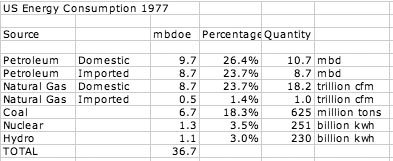
You can see, already, in the years since 1970, that imports had become almost half of American supply, and even back in 1970 they provided 24% of consumption. The book “Energy Future” was written to suggest a transition from imported oil, to a more balanced, and more domestic, energy supply. Thus the various chapters examined ways to increase production, or at least maintain existing levels, for the different fuel sources. Since we are mainly about oil and natural gas (and because I want to include other references) let me just very crudely condense the two relevant chapters. But to give some cover to the authors, it should be remembered that the book was written just after the Three Mile Island incident. The authors look at two possible solutions, removing price controls and easing drilling restrictions to increase conventional recovery, and unconventional recovery through the processing of oil shale. They conclude that even by the year 2000 the latter would be unlikely to make any significant contribution, and thus they anticipate that oil production levels would be maintained at 1977 levels, through increased production from conventional wells. However they go on to state (page 44)
Thus, the total oil output in the late 1980’s from both known and newly found oil fields and from enhanced recovery will likely approximate 10 million barrels daily, about the same as current production. Even this level is quite speculative and perhaps on the optimistic side. To maintain that production level would require the finding of almost four billion barrels annually, but there has been only one year in the last thirty in which more than three billion barrels of reserves have been found.However their optimism is mild relative to the experts from 1974 that they quote
Administration experts, with the aid of large computer models, argued that domestic production could reach 15 million or even 20 million barrels daily, and that U.S. imports thus could be reduced to zero. They said this would require an eleven-dollar a barrel oil price (in 1973 terms) which, in fact, was not much higher than the 1975-78 prices for newly found oil.(Hmm! Parts of that sound a bit familiar). The chapter concludes that it would not be realistic to anticipate that domestic production could (for the reasons cited above) exceed 1977 values, and thus in order to reduce the reliance on foreign oil, the United States should look to fuel sources other than oil. Natural Gas had been a regulated fuel in the United States until 1978, and in a great debate about deregulation of price it was agreed that the nation would be unlikely to see any increase in production beyond the 20 tcf then being provided, but the USGS predicted that at that rate the US would have enough reserves for between 44 and 100 years, while the CIA suggested the reserve would last 50 to 60 years. It was then in process of deregulation and the authors conclude the chapter with the paragraphs
First, higher prices might stimulate exploration to such an extent that the discovery of new reservoirs would support consumption in excess of the current 20 tcf per year, say 25 tcf per year or more. In that case, new electric generating plants might even be permitted to use natural gas. This seems, on the available evidence, to be the lest likely outcome, but it is possible. Second, and only slightly more likely, is that higher prices could fail to stimulate more than the current 10 tcf of new discoveries per year. The third and most likely outcome is that annual discoveries will range between 10 tcf and 25 tcf per year. Within that range, a figure closer to 10 tcf means further restrictions on the industrial use of gas as boiler fuel and as feedstock, plus stern enforcement of mandates to convert existing gas-fired industrial and electric utility boilers to coal.Based on these assumptions, and some discussion of alternative fuelds, the authors ended with a prediction that gave, by the end of the 1980’s, the following anticipated progress in fuel supply.
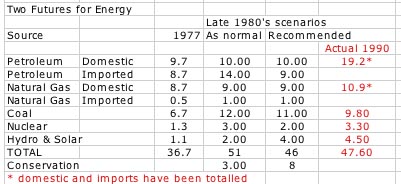
I have added the actual data (taken from the EIA International Energy Outlook 2005. Not having looked at the accuracy of their prediction, I must confess to being a little more impressed than I expected to be (since my estimates were somewhat different). In the following book, Global Insecurity, the topic became rather the world supply with the prevailing supplies being given as:
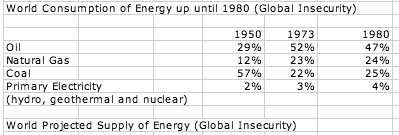
Most of the book deals with a nation by nation analysis, and so I will just extract one table, and give the tables for world energy consumption in 1978 and their projected use in 2000, under two scenarios.
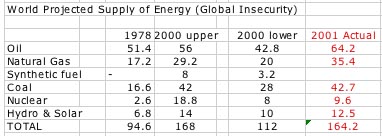
And by now there is some clearer difference appearing in the energy levels coming from different sources. Unfortunately for their original proposition much more of it is coming from imported oil than they had anticipated. Next to come out of that dark corner of my bookshelf is a small book “Coal and Energy” by the then ex-Chair of the British National Coal Board, Sir Derek Ezra, who made the following predictions in 1978, for world energy demand comparing 1974 with projections for 1985 and 2000. He focused purely on the world outside the then Communist regions.

However, while of limited interest, he did also include projections of oil imports for various nations within those time frames:

In regard to which a book on Coal – Bridge to the Future by the World Coal Study Group in 1980 looked at three possible scenarios for oil production from around the world and came up with:

It is interesting that none of these is considering demand growth from China. In regard to the increase in prices over the years, the United Nations Economic Commission for Europe wrote a report on Coal:1985 and Beyond, where they anticipated that Oil prices would rise 3.25 times between 1970 and 2000, Natural gas prices would rise 7.56 times and coal prices would drop to 86% of the price. The National Research Council who in 1978 came out with a report on Energy Modelling for an Uncertain Future, projected the introduction of the Fast Breeder Reactor in 2000, and thus came up with:
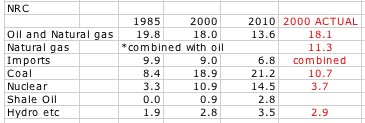
This was part of a much larger study that covered more than 6 scenarios with overall demand varying from around 28 mbdoe to about 75 mbdoe. If there is interest I could reproduce them, but otherwise I will let these examples speak for themselves. It does appear that the predictions for nuclear energy were the most optimistic, relative to the actual result.




As mentioned in another thead today, nuclear and hydro-elec power generation was the magic bullet for total energy needs in this era. IEA & EIA based the 1995 & Y2K Outlooks on that premise. It is easy to monday morning quarterback that strategy now. Nobody knew the treehuggers would win that battle but lose the war. Lose?
Yes, by derailing hydro & nuclear, they by default forced the promotion of status quo coal, oil & gas. These "environmentalists" promoted fossil fuel use in lieu of GHG-free hydro & nuclear alternatives. And the rest is history (384ppm co2).
Hydro is not "greenhouse-gas free." Not by a long shot.
Al Gore just boiled a frog. They had to pay those people to clap. I know. I have this problem at my elections.
If we do manage to invent a profitable way of extracting plutonium from "fissium" for fabrication into Light Water Reactor fuel, we are in good shape. Otherwise, we can still build gas cooled fast reactors with the fuel we didn't burn in the hundreds of Light Water Reactors we didn't build.
But global warming wouldn't be as bad as it is now, that's true.
The latest greatest is liquid metal reactor pushed by argonne that burns light water waste (with cadmium and short lived bits removed), essentially burning all the actinides. This might be the way to go if/when uranium gets dear. Meanwhile, hold on to that waste... it will keep our kids out of the dark.
Puzzling to me is that CERA has stated that "Peak oil theory is garbage" while Yergin was a collaborator on chapter two of Future Energy: "After the Peak: The Threat of Hostile Oil" where the peaking of US oil production in 1970 as you mentioned above is the key point of the chapter.
I'm wondering is Robert Stobaugh is still around and what his views would be today. Yergins name was list second on the credits so I think that Stobaugh was carrying the load for this research at the time. The message of this chapter is in contrast to the issue being barely touched in The Prize.
cheers
I am not an academician and would probably not have the right approach. I will contact him if no one else does, however within the limited time that I have.
I think he may have an interesting perspective that could be helpful.
Perhaps he realized the lure of the American lifestyle and the resulting importance of the US military securing mideast oil. Since the majority of the American public would never go for this solution, he created a private disinformation campaign funded by the oil industry.
'The future is now' was a wonderful expression from George Allen during his coaching stint for the Washington Redskins - he cared about winning, and was willing to sacrifice future trades for immediate results.
But the expression is even more relevant for what America forgot - the future of 1976 is pretty much today, 2006 - a highly unstable Middle East, with American soldiers being used to secure oil supplies, and an American society which took essentially no concrete actions in terms of efficiency/conservation or changing how it lived.
And ExxonMobil making a cool $40 billion in profits, with a Secretary of State that had an oil tanker named after her, with a failed oil man as President, and a Vice President paid deferred compensation for his service to an oil services company.
Quite honestly, most people in 1976 would not have found 2006 all that much a parody really - they pretty much believed then that giant oil companies owned the political system. As for environmental degradation - no surprise there either, by the way.
The real mystery is why it continued so long in North America until people finally saw what the American Dream would mean for them, personally, and not merely their children or grandchildren.
Personally, I find it fitting the baby boom will get to live in the nest it so thoroughly fouled, instead of enjoying the party without cleaning up.
How is that Arctic ice melting going, by the way? The one that wasn't scheduled until sometime around 2040? And how is the schedule looking for oil deliveries from Saudi Arabia, which will be ramping up to 12 mbpd any day now, after the oil market is no longer so flooded.
The future is now. Have fun.
You are absolutely correct Expat. Around 1976, I bought the detailed version of "Dynamics of Growth in a Finite World" (ISBN 0262131420) which is more familiar as the World3 model.
At that time, I was really keen on System Dynamics and the modeling language DYNAMO which this piece of research is based on. I carted it back to Tehran (it is big) and a few years later had to abandon it to the mullahs. I doubt if they read it. Anyway, the end of the world is good news to some of them - they are so similar to some Americans.
The point that I am trying to make is that we are going pretty close, I guess, to what they postulated in 1974 to general ridicule. It is funny how people turn off when the news are unfavourable.
Any who have would know that he clearly has a grasp of peak-issues. And was writing about them at least 20 years before people had heard of Deffeyes.
Yergin understands oil. Most peak-oil advocates are clowns. I'm not saying this to be mean. It is just the case. Heading Out hasn't even read his book. He writes about some video. It's crazy.
About mid 80's to current the focus of the debate changed from conservation and limited oil supply to "abundance." Geology didn't change but the price of oil dropped -- a huge disparity -- I am not 100% sure of all the causes of the shift in focus but the best study I've seen is found in the book Victory: The Reagan Administration's Secret Strategy That Hastened the Collapse of the Soviet Union which documents an agreement between the US and Saudi Arabia to produce oil all out, lowering the oil price to damage the oil export-dependant USSR.
I think the word "leaders" in the context of politicians is a misnomer. Leaders may be a figurehead, but really they can only lead where people want to go.
When I worked in Germany, while they are generally quite well off, I was impressed with the level of "Green" awareness. Recycling is taken as read, if you don't recycle you get odd looks. The spaces in the car park where strictly allocated by distance from work - this applied to directors as well. Their mindset really is quite different, I think it shows a different path can be taken if the populace are on board with the concept.
The bringing online of North Sea, deepwater and Brazil as oil production was also a factor but the biggest was probably OPEC and the USSR.